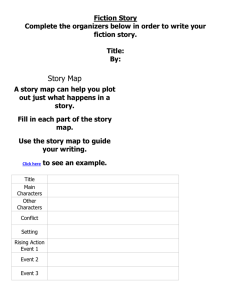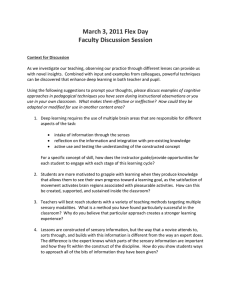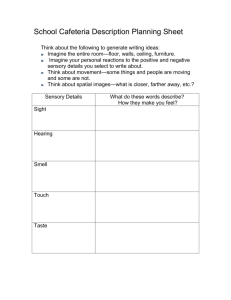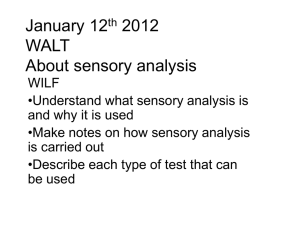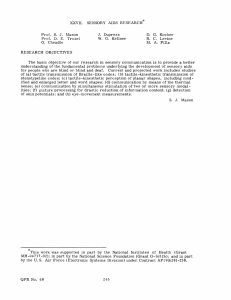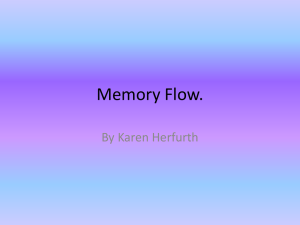ENEE719P, Spring 2003, University of Maryland, College Park
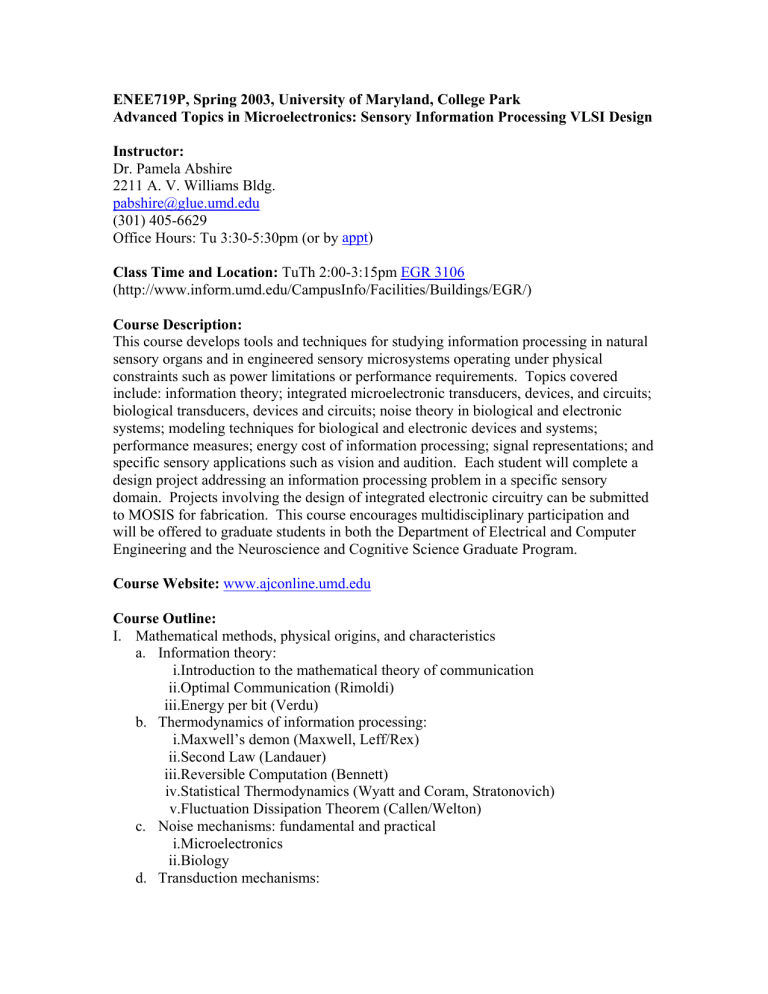
ENEE719P, Spring 2003, University of Maryland, College Park
Advanced Topics in Microelectronics: Sensory Information Processing VLSI Design
Instructor:
Dr. Pamela Abshire
2211 A. V. Williams Bldg. pabshire@glue.umd.edu
(301) 405-6629
Office Hours: Tu 3:30-5:30pm (or by appt )
Class Time and Location: TuTh 2:00-3:15pm EGR 3106
(http://www.inform.umd.edu/CampusInfo/Facilities/Buildings/EGR/)
Course Description:
This course develops tools and techniques for studying information processing in natural sensory organs and in engineered sensory microsystems operating under physical constraints such as power limitations or performance requirements. Topics covered include: information theory; integrated microelectronic transducers, devices, and circuits; biological transducers, devices and circuits; noise theory in biological and electronic systems; modeling techniques for biological and electronic devices and systems; performance measures; energy cost of information processing; signal representations; and specific sensory applications such as vision and audition. Each student will complete a design project addressing an information processing problem in a specific sensory domain. Projects involving the design of integrated electronic circuitry can be submitted to MOSIS for fabrication. This course encourages multidisciplinary participation and will be offered to graduate students in both the Department of Electrical and Computer
Engineering and the Neuroscience and Cognitive Science Graduate Program.
Course Website: www.ajconline.umd.edu
Course Outline:
I.
Mathematical methods, physical origins, and characteristics a.
Information theory: i.Introduction to the mathematical theory of communication ii.Optimal Communication (Rimoldi) iii.Energy per bit (Verdu) b.
Thermodynamics of information processing: i.Maxwell’s demon (Maxwell, Leff/Rex) ii.Second Law (Landauer) iii.Reversible Computation (Bennett) iv.Statistical Thermodynamics (Wyatt and Coram, Stratonovich) v.Fluctuation Dissipation Theorem (Callen/Welton) c.
Noise mechanisms: fundamental and practical i.Microelectronics ii.Biology d.
Transduction mechanisms:
i.Physics / biophysics ii.Information Processing / Filtering iii.Models (Miller, Johnston/Wu)
II.
Visual information processing a.
Light and information b.
Sensory coding: Barlow/Atneave/Atick/Laughlin c.
Spatial information capacity d.
Neuromorphic engineering / synthetic sensory Microsystems e.
Visual communication (Huck and Fales. Fales and Huck)
III.
Tradeoffs in microelectronics: a.
Sensory coding for filter banks (Furth and Andreou) b.
Information-power tradeoffs for different signal representations, filter banks
(Hosticka, Furth and Andreou) c.
Sensory coding for imagers (Andreou) d.
Information-power tradeoffs for photoreceptors and imagers (Abshire and
Andreou) e.
Information-power tradeoffs using linear models (Shanbhag, Abshire and
Andreou) f.
Information-power tradeoffs for simple linear systems (Abshire)
IV.
Tradeoffs in Biology a.
Blowfly photoreceptor as a communication network (I) - information processing level b.
Blowfly photoreceptor as a communication network (II) - physical level c.
Energy cost of information processing
V.
Advanced Topics a.
Information in Nonlinear systems: nonlinear dynamics, chaos, CMOS inverter, spikes b.
Other Costs: design, fabrication, evolution, ontogeny c.
Other Performance Measures d.
Noise/Measurement in Quantum Systems
Texts:
No texts are required for this course. Course materials will be derived from journal articles and excerpts from books. These materials will be distributed during lectures, posted on the course website or available in hard copy outside the instructor’s office,
2211 A. V. Williams. A cumulative bibliography for the course materials will be available on the course website.
Course Announcements:
In the beginning of the course, I will attempt to verify that class notifications are reaching your email address, however, it will be your responsibility to ensure continued reception of class information. All class announcements will be posted onto the class website as an alternative means of retrieving updated information.
Grading:
Your final grade will be based on class participation, assignments, presentations, and a final project. The following is a tentative weighting for determining overall grades.
Class Participation – 10%
Assignments (Takehome Midterm, Literature Review, Mini-project) – 30%
Class Presentations – 10%
Final Project – 50%
Absences:
While it is my intent to respect our diverse community's religious observances, it is the student's responsibility to inform me in writing (email) of any intended absences for religious observances in advance. Notice should be provided as soon as possible but no later than the end of the second week of classes.
Academic Integrity:
Academic dishonesty will not be tolerated. All work submitted for grading must be your own. In the case of group projects a summary should indicate the contributions of all members of the group. The University Code of Academic Integrity, which can be found at http://www.inform.umd.edu/CampusInfo/Departments/JPO/ , prohibits students from committing the following acts of academic dishonesty: cheating, fabrication, facilitating academic dishonesty, and plagiarism. Instances of academic dishonesty will be referred to the Office of Judicial Programs.
Tentative Schedule (subject to change):
Wk Date Topic
1 Jan 28 Course overview; introduction to information theory
1 Jan 30 Information Theory: Mathematical theory of communication
2 Feb 4 Optimal Communication
2 Feb 6 Capacity per unit cost
3 Feb 11 Thermodynamics of information:
Maxwell’s demon, Second Law thermodynamics
4 Feb 18 Fluctuation Dissipation Theorem
4 Feb 20 Noise theory: fundamental and practical mechanisms
5 Feb 25 Noise mechanisms: Microelectronics
5 Feb 27 Noise mechanisms: Biology
6 Mar 4 Transduction mechanisms: Physical Level
Functional Level
6 Mar 6 Transduction mechanisms: Models
7 Mar 11 Information theory, sensory processing and
References
Shannon, Shannon and
Weaver
Shannon and Weaver,
Cover and Thomas
Rimoldi, ElGamal
Verdu
Leff/Rex, Landauer
Bennett, Wyatt and
Coram, Stratonovich
Callen/Welton
Van der Ziel,
Pavasovic
De Felice
Koch, Abshire and
Andreou
Manwani and Koch,
Miller, Johnston/Wu
Richards
7
8
Mar 13
Mar 18 visual communication
Light and information
Sensory coding
8 Mar 20 Sensory coding
9 Mar
25-27
Spring break
10 Apr 1 Spatial information capacity
Jones, Bershad,
Francia
Barlow, Atneave,
Laughlin
Atick
10
11
Apr 3
Apr 8
Neuromorphic Engineering / Synthetic Sensory
Microsystems
Visual communication
Snyder et al., Banks et al.
Boahen and Andreou,
Boahen
Fales and Huck , Huck and Fales
Hosticka, Furth and
Andreou
11 Apr 10 Tradeoffs in microelectronics:
Sensory coding and Information-power tradeoffs for different signal representations, filter banks
12 Apr 15 Sensory coding and Information-power tradeoffs for photoreceptors and imagers
12 Apr 17 Information-power tradeoffs using linear models and for simple linear systems
13 Apr 22 Tradeoffs in Biology
Blowfly photoreceptor as a communication network (I) - information processing
13 Apr 24 Blowfly photoreceptor as a communication network (II) - physical level
Andreou, Abshire and
Andreou
Shanbhag, Abshire and Andreou, Abshire van Hateren
Abshire and Andreou
14 Apr 29 Energy cost of information processing
14 May 1 Advanced Topics:
Other Costs: design, fabrication, evolution, ontogeny
15
15
May 6
May 8
Nonlinear systems: nonlinear dynamics / chaos
/ CMOS inverter
Nonlinear systems: spikes
16 May 13 Other Performance Measures
Noise/Measurement in Quantum Systems
May 20 Final Project Presentations 10:30 am-12:30 pm
Laughlin et al.
Williams et al.,
Gillooly et al.
Abshire
Goldberg et al.
